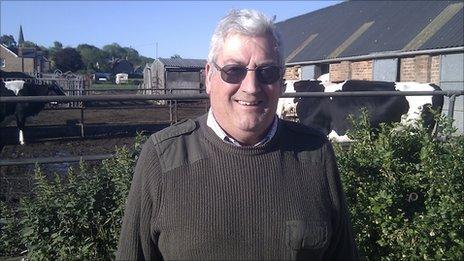Berkshire dairy farmer sells up amid milk price battle
- Published

Michael Bowden said he has had a 2p rise in payment for milk, but his costs have gone up by 5p
The National Farmers' Union (NFU) is meeting with MPs later to discuss improved milk contracts for dairy farmers.
But this comes too late for Michael Bowden from Brimpton in Berkshire.
He is the proud descendant of generations of dairy farmers, but is ending a century of family history by selling off his herd of cattle.
Mr Bowden is one of 10 farmers a week in England giving up milk production because of little or no profits.
"We've been fighting low prices for quite some time. I've been struggling for the past five years.
"It's not something I want to do. Cows are my life. I've bred them, I know them, they're almost friends, but we've just got to because we can't go on losing money."
Clarity plea
Nigel Stacey, chairman of South East NFU Dairy Committee, said that the average cost of milk production is 31p a litre, but that the average milk price is 26p.
"This means farmers are losing at least four pence a litre," he said.
He added that Berkshire had lost a third of its dairy farmers over the past five years, and predicted that in 10 years the amount of dairy farmers in the county will drop from 10,000 to 5,000.
The NFU is meeting with MPs to try to reverse this portentous prediction by asking for more transparent contracts that clarify how a supermarket has calculated its milk price.
The union also wants to shorten contracts.
"They lock dairy farmers in for long notice periods of up to 18 months, with no ability to supply milk to any other buyer," said Mr Stacey.
"We can't store milk.
"What we produce on the farm today is picked up today. We can't play the market, we have to take the price we're given."
Mr Bowden said he had to plan years in advance for milk prices that fluctuate almost monthly.
"It takes up to three years to get a cow into milk, from when she's born as a calf to when she produces her first pint of milk," he said.
'Great stress'
"In that time you have absolutely no idea of what the cost of producing milk is. You have no idea of what you're going to get for a pint or a litre of milk. The whole thing is totally up in the air."
Mr Bowden believes the problems for dairy farmers started with the dissolution of the Milk Marketing Board in 2002, which formerly set the minimum price for milk producers.
Consumer demand for cheaper prices, however, is not part of the problem, according to Mr Stacey.
"There is money in the milk chain," he said.
"If you take the big supermarkets, after alcohol, the second biggest money earner is dairy products."
He added: "The profits that supermarkets and retailers are making are not being passed back down the line to dairy farmers."
A spokesman for the British Retail Consortium, which represents four of the UK's major supermarkets, said the industry's "own figures show the top 13 best paying milk contracts are all paid by supermarkets".
He added of the contract length: "Supermarket contracts are aimed at achieving long-term relationships to guarantee supplies.
"They are regularly reviewed to take account of price fluctuations and are the envy of those farmers not involved."
The Government is in the process of introducing a delayed draft bill to establish a Groceries Code Adjudicator (GCA), which aims to resolve disputes between supermarkets and their suppliers.
The European Commission is also meeting later to discuss improvements to milk contracts across the EU.
A Dairy UK spokesman said legislation on contracts will not impact on the fact that many dairy farmers are "under pressure because of soaring input costs", and that "dairy farmers are currently receiving some of the highest prices ever seen."
In the meantime, Mr Bowden will be selling his herd of cows on 6 July.
"It's a time of great stress," he said. "Some farmers can't cope with what's going on because their life has been destroyed."
- Published17 March 2011
- Published3 August 2010
- Published15 September 2010